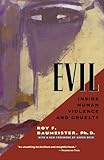My review of it can be found here: http://www.tjradcliffe.com/?p=1605
Short version: Baumesiter focuses on data, not imaginary scenarios, which he correctly identifies as profoundly misleading (which should be no surprise to anyone paying attention to the past 300 years of scientific history, which has basically been a monotonous repetition of "Your imagination is a terrible tool for knowing reality"). He defines and rejects the imaginary "myth of pure evil" and investigates empirically what causes evil and how it works in the real--not the imaginary--world.
The causes he identifies are fragile egotism, material gain, utopian idealism, and sadism (the last is the least, accounting for perhaps 5% of evil acts.) He backs his claims with data, not imagination, and anyone arguing against him must bring far more than "it just makes sense to me" as a counter.
I can't recommend this book enough. Is it the last word on the subject? Of course not: it is science, and therefore open-ended. But it is so much better than almost anything else you will read on evil that complaining about its shortcomings looks silly. It is certainly vastly better than the purely imaginary accounts of evil found in the Bible or the Quran or "A Treatise on Human Nature", to the extent that they are incidently but convincingly shown to be completely irrelevant as practical guides to human behaviour.
That tends to support the claim that these are "bad people" in the ordinary sense of the term.
It is pretty well documented that almost no one thinks they are a bad person: http://www.amazon.com/Evil-Inside-Human-Violence-Cruelty/dp/... (I cannot recommend this book enough if you're interested in understanding evil.)


[Edit: irrelevant argument removed]